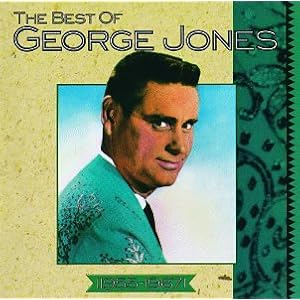
I came late to George Jones. I came late to country music generally, but I already had Kitty, Patsy, both Hanks, Merle, Buck, and Eddy before I happened upon a cassette copy of The Best Of George Jones at Future Shop. It may have been the only recording I ever bought at Future Shop. Then I found The Essential George Jones: The Spirit Of Country, and some local library back home, and I merged the 2 here.
George Jones
•
Why Baby Why – Classic stuff. Well she’s done him wrong, we can hear that. But this isn’t just accusations; it’s the momentous question of the title. It’s rhetorical and not rhetorical, all at the same time. His debut single, this was a top 10 country hit in 1955.
•
Just One More – Get into that waltz mood, and have one more drink just to forget her. From 1956.
•
Color Of The Blues – Seeing sadness in everything. It’s that cry in his voice that makes it all so powerful. From 1958.
•
White Lightning – Written by The Big Bopper. This song about moonshine was Jones’ first pop hit, and his highest charting, reaching number 73 in the spring of 1959.
•
Who Shot Sam – A western drama, with a great rhythm. From the summer of 1959.
• The Window Up Above – A song about lost opportunities, and they are always much better and more solid in our imagination.
•
Tender Years – A woman’s choice of a partner (who isn’t George) ascribed to her youth. Anything but face the reality…From the winter of 1961.
•
Achy Breaky Heart – Years before Billy Ray Cyrus. “You think that hurtin’ me” says our hero, “will make me love you more.” Sometimes relationships just don’t make sense….
•
She Thinks I Still Care – Huge, this song. Can’t count the recordings. Off hand, though, I remember Cher, and someone just clued me in to Harry Connick, Jr. Ok. A song about the art of denial, how our true feelings get around regardless of what we think or say or do. George, of course, knows it all too well. In real life it’s not so up front. Hurray for country music.
•
A Girl I Used To Know – It’s true, someone who is up front and centre in your life can become nothing but background noise. Sad.
•
We Must Have Been Out Of Our Minds – A duet with Melba Moore. About making the wrong choices. The road is so straight here: we split, hooked up with others, and both regretted our respective choices. Well okaaaayyy.
•
You Comb Her Hair – A silly song about parenthood.
• My Favourite Lies – Another song about denial. Not much room for the unconscious in country songs…
•
She’s Mine – One of those trick songs like 18 Yellow Roses. The girl he’s singing about, the one he pines for whose heart belongs to another, is his little girl, and she’s pining for her mother who “left this world.” I don’t have patience for this.
•
I’ll Share My World With You – Just a plain and simple statement of what good love is all about. If only…
•
The Race Is On – The whole metaphor thing about love losing and heartache winning, it’s cute. Really though, it’s silly. Jones, though, sings it with such conviction that he redeems the whole mess. This was a small hit for Jones in the winter of 1965, and a much bigger one for Jack Jones (no relation) in the spring of the same year.
•
Love Bug – Another silly song. This one is happy, and it’s not what Jones does best. Jack Jones took this one too, put it on the chart late in 1965, but he was better at this sort of thing.
•
I’m A People – Jones in a playful mood. Ok for a while, but please, bring on the heartache…
• Walk Through This World With Me – I’ll share my world with you, he said in earlier song. Here it’s not his world, it’s just the world, and it’s just a different way of looking at the same phenomenon.
•
If My Heart Had Windows – An interesting idea. We’d see a lot of blood…
•
A Good Year For The Roses – Dave Marsh writes about how chauvinistic a goodbye song this is, and surely he is correct, and how “the oaf stands there talking about his garden.” Sure he does, but that’s the point, isn’t it. Life is falling apart, but meanwhile life around us goes on, the grass grows and needs mowing, the roses are in bloom, maybe even the Canadiens won last night’s game. And of course the way he sings it, well, what more can I say.
•
We Can Make It – Just another song about facing down the odds…
•
The Ceremony – A wedding song, with Tammy Wynette. Very syrupy, but I love Tammy.
•
Loving You Could Never Be Better – …than it is today. But wait, what about tomorrow, George?
•
A Picture Of Me (Without You)•
We’re Gonna Hold On – With Tammy Wynette.
•
Once You’ve Had The Best•
The Door•
Grand Tour – George takes on the subject of war, and puts his own distinct personal slant on it.
•
These Days (I Barely Get By)
•
Golden Ring•
Her Name Is – A silly song about adultery.
•
Near You – A hit for Roger Williams, but this is the first time I heard the words.
•
Bartender Blues – James Taylor’s version of workingman blues.
•
Maybelline – Chuck Berry rock and roll, country style.
•
Two Story House – Another record with Tammy Wynette. The story of how the different parts of our dreams don’t seem to work in synch.
•
He Stopped Loving Her Today – Songs about death don’t usually work, but this on does. Great stuff, classic country.
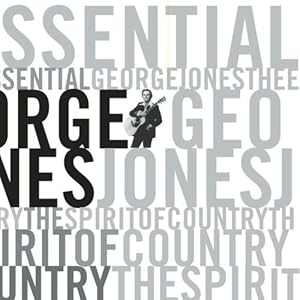
•
I’m Not Ready Yet – A relationship that’s constantly on the brink. It’s a song about a very phenomenon, and when he’s ready, he’ll know it.
•
If Drinkin’ Don’t Kill Me (Her Memory Will) – Nothing says “country” like drinking to forget a heartache. And nothing says “country” like it doesn’t work.
•
Still Doin’ Time•
Same Ole Me•
Yesterday’s Wine – George does Willy Nelson.
•
I Always Get Lucky With You – A great song about a long-lasting love. Cf Merle Haggard’s Let’s Chase Each Other Round The Room Tonight. • We Didn’t See A Thing
•
Who’s Gonna Fill Their Shoes – A tribute song.
•
I’m A One Woman Man – George does Johnny Horton.
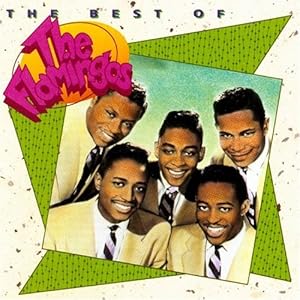 Did the group really perform entire concerts standing on one leg?
Did the group really perform entire concerts standing on one leg? This guy had 4 hit records, 2 big, and 2 not so big. They all came out in 1959 and 1960. Wikipedia says that he was inducted into the Rock And Roll Hall Of Fame but it doesn’t say why, and there is no obvious reason.
This guy had 4 hit records, 2 big, and 2 not so big. They all came out in 1959 and 1960. Wikipedia says that he was inducted into the Rock And Roll Hall Of Fame but it doesn’t say why, and there is no obvious reason.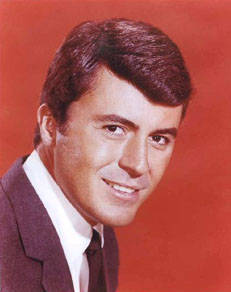 As a singer they say that James Darren was a good actor, but it could be that as an actor he was a good singer. I never saw his movies; he was in Gidget, among others, with Sandra Dee. The TV series came later; it starred Sally Fields.
As a singer they say that James Darren was a good actor, but it could be that as an actor he was a good singer. I never saw his movies; he was in Gidget, among others, with Sandra Dee. The TV series came later; it starred Sally Fields. Ray Peterson, that sounds like an accountant, not a pop singer. But a pop singer he was. He had a handful of hits in the early 60s, and I have his 3 biggest.
Ray Peterson, that sounds like an accountant, not a pop singer. But a pop singer he was. He had a handful of hits in the early 60s, and I have his 3 biggest.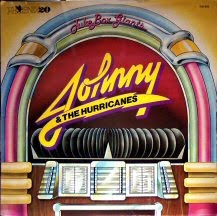 Immortalized by The Kinks in One Of The Survivors, Johnny & The Hurricanes were an instrumental “combo” that put 9 records into the top 100 over a 3 year period, beginning in 1959.
Immortalized by The Kinks in One Of The Survivors, Johnny & The Hurricanes were an instrumental “combo” that put 9 records into the top 100 over a 3 year period, beginning in 1959.
 A wild man from Arkansas lost in the jungles of Toronto, a big fish in a small pond – that was Ronnie Hawkins, who built himself a rock and roll empire that few knew about outside TO the good.
A wild man from Arkansas lost in the jungles of Toronto, a big fish in a small pond – that was Ronnie Hawkins, who built himself a rock and roll empire that few knew about outside TO the good.
 The Waylors were Waylon Jennings’ backup band at some point, and of course The Wailers were Bob Marley’s band. These Wailers were neither.
The Waylors were Waylon Jennings’ backup band at some point, and of course The Wailers were Bob Marley’s band. These Wailers were neither. Another odd name for a group. They could have called themselves the Siestas and done an album of lullabies, or very boring songs. The Fiestas, that’s like the Celebrations or The Parties or The Happy Times.
Another odd name for a group. They could have called themselves the Siestas and done an album of lullabies, or very boring songs. The Fiestas, that’s like the Celebrations or The Parties or The Happy Times. He died young.
He died young. Exotica was a cottage industry back in the day; that was music whose sound was meant to evoke a tropical paradise. Usually it was a lot of chirping sounds that did it. Les Baxter was one purveyor of said style, though his hits were straight MOR. Martin Denny was another, and he also did a mix of straight MOR and exotica, and his music was heard in elevators throughout the land.
Exotica was a cottage industry back in the day; that was music whose sound was meant to evoke a tropical paradise. Usually it was a lot of chirping sounds that did it. Les Baxter was one purveyor of said style, though his hits were straight MOR. Martin Denny was another, and he also did a mix of straight MOR and exotica, and his music was heard in elevators throughout the land. I came late to George Jones. I came late to country music generally, but I already had Kitty, Patsy, both Hanks, Merle, Buck, and Eddy before I happened upon a cassette copy of The Best Of George Jones at Future Shop. It may have been the only recording I ever bought at Future Shop. Then I found The Essential George Jones: The Spirit Of Country, and some local library back home, and I merged the 2 here.
I came late to George Jones. I came late to country music generally, but I already had Kitty, Patsy, both Hanks, Merle, Buck, and Eddy before I happened upon a cassette copy of The Best Of George Jones at Future Shop. It may have been the only recording I ever bought at Future Shop. Then I found The Essential George Jones: The Spirit Of Country, and some local library back home, and I merged the 2 here.
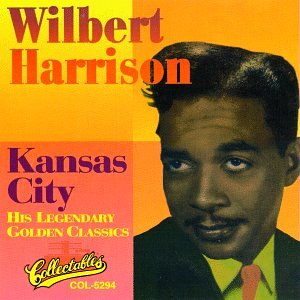 I had, or someone else had, a K-Tel album, or probably a Syndicate Records album, Syndicate being the precursor of K-Tel, that had Kansas City on it, and it was credited to Wilbur Harrison. So to me, Wilbert Harrison was always Wilbur, and his real name took some getting used to. This is a collection I found recently, in this city, at the library, the one library that was in the paper recently, some letter writer complaining about the paucity of English books, and he’s probably right, there are probably 10 French books to every English one, but it’s a provincial library, and this is a French province. But the CD collection is what it is, and nobody tried to translate Wilbur, I mean Wilbert, Harrison into French. It’s called Kansas City: His Legendary Golden Classics. The CD is called that, not the library.
I had, or someone else had, a K-Tel album, or probably a Syndicate Records album, Syndicate being the precursor of K-Tel, that had Kansas City on it, and it was credited to Wilbur Harrison. So to me, Wilbert Harrison was always Wilbur, and his real name took some getting used to. This is a collection I found recently, in this city, at the library, the one library that was in the paper recently, some letter writer complaining about the paucity of English books, and he’s probably right, there are probably 10 French books to every English one, but it’s a provincial library, and this is a French province. But the CD collection is what it is, and nobody tried to translate Wilbur, I mean Wilbert, Harrison into French. It’s called Kansas City: His Legendary Golden Classics. The CD is called that, not the library.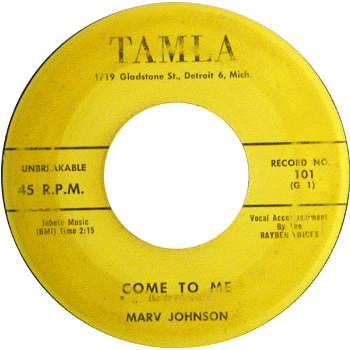
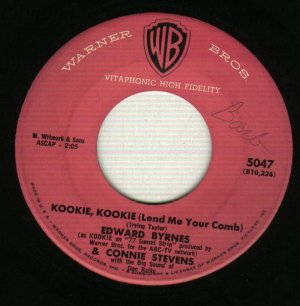 Byrnes was an actor, know as Edd Byrnes, whose most famous role was in the TV show 77 Sunset Strip, the name of which I recall from my childhood, but which I don’t remember actually seeing ever. He had a follow-up to Kookie Kookie, called Like I Love You released a few months later, but beyond that he had no more hits. He did have something of a recording career, and it may be worth exploring.
Byrnes was an actor, know as Edd Byrnes, whose most famous role was in the TV show 77 Sunset Strip, the name of which I recall from my childhood, but which I don’t remember actually seeing ever. He had a follow-up to Kookie Kookie, called Like I Love You released a few months later, but beyond that he had no more hits. He did have something of a recording career, and it may be worth exploring.
